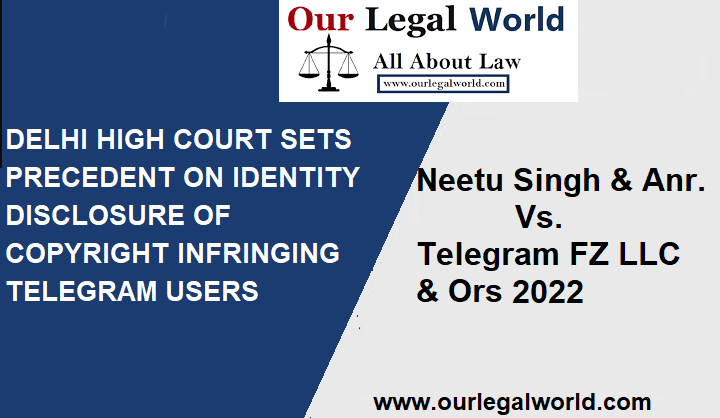Delhi High Court in NEETU SINGH vs TELEGRAM FZ LLC Sets Precedent On Identity Disclosure Of Copyright Infringing Telegram Users
Facts
In Neetu Singh & Anr. Vs. Telegram FZ LLC & Ors. (hereinafter “Neetu Singh”), Plaintiff No.1, Ms Neetu Singh is a renowned author of books which are designed to train students aspiring to take various competitive examinations. Ms. Neetu Singh founded Plaintiff No.2, M/s K.D. Campus, which runs coaching centres for these competitive exams. Plaintiffs’ copyrighted works including course material, online lectures and other works were disseminated unauthorizedly through various channels of Defendant No. 1, Telegram. Upon receipt of the notices to take down the impugned channels, some channels were taken down by Telegram but some infringing channels continued to exist and new channels came up almost on a daily basis. Therefore, the Plaintiffs filed a suit seeking permanent injunction restraining the defendant from infringement of their copyright and filed an application seeking discovery of the details of the persons who are operating these channels.
In Living Media India Ltd. & Anr. vs. Telegram FZ LLC & Ors. (hereinafter “Living India Media Ltd.”), the Plaintiff No. 1 represents the India Today Group which disseminates its published content usually behind a paywall. Plaintiff’s content was being unauthorisedly shared on Defendant No. 1, Telegram’s channels. Therefore, Plaintiff filed a suit seeking permanent injunction restraining the Defendants from infringement of their copyright and an interim injunction directing Defendant No. 1 to disclose the identity/Basic Subscriber Information of the accounts, their creators, administrators, etc.
Arguments On Behalf Of The Plaintiffs
In Neetu Singh, the Plaintiff’s Counsel submitted that as per the Privacy Policy of Telegram, if there is any violation, Telegram is liable to take down channels and also disclose the information relating to the persons who are running the said channels. While impugned channels are being taken down by Telegram, new channels with small modifications in their names continue to be created. Accordingly, the identity of the persons who are disseminating the infringing materials on these channels ought to be disclosed, so that the Plaintiffs can avail of their remedies against the said persons. The Counsel further contended that reliance on Singapore law would not be appropriate in the present circumstances as any competent Court is empowered to pass directions in respect of a mobile platform which is operating in India.
Arguments On Behalf Of The Defendants
The Counsel for the Defendant argued that the existing arrangement in place directing Telegram to take down the impugned channels is sufficient to protect the interest of the Plaintiffs and as per the Privacy Policy of Telegram, until and unless a person is expected to be a terror suspect, the disclosure of the subscriber information cannot be made. The Counsel relied on Justice K.S. Puttaswamy v. Union of India & Ors., [(2017) 10 SCC 1] to argue that until a law requires disclosure of information, it is not permissible to direct disclosure inasmuch as the privacy of the person operating the said channel would be protected by Article 21 of the Constitution of India. Reliance was placed on Rule 3(1)(d) of the Information Technology Intermediary Guidelines and Digital Media Ethics, 2021, which requires the intermediary to take down or remove or disable access to the unlawful information. Further, on the basis of Rule 4, unless and until, any one of the situations as contemplated in the first proviso to Rule 4(1)(2) of the said guidelines is satisfied, even a Court order cannot be passed directing disclosure of the basic subscriber information.
The Counsel argued that Telegram has its servers based in Singapore which has encrypted data and its decryption would not be permissible except as per the laws of Singapore. They relied on the Personal Data Protection Act, 2012, of Singapore where under Section 17, Telegram may reveal certain information upon direction by a “Court”, since the “Court” in terms of the Interpretation Act of Singapore, 1965, would only mean a Court based in Singapore, not a Court in India. Finally, Section 72A of the Information Technology Act, 2000 was cited, which provides that any disclosure of information in breach of a contract i.e., the contract between the Telegram platform and the creator of the impugned channels, would also be contrary to law and could constitute an offence.
Observations Of The Court
In Neetu Singh, the Delhi High Court observed that merely due to the fact that the persons disseminating the copyrighted works, are using the Telegram app and the said app retains its data on servers outside India, the jurisdiction of this Court cannot be ousted. The Court stated that copyrighted materials on Telegram channels would be “communication to the public” as per Section 2(ff) of the Copyright Act. The circulated copies would constitute infringing copies under Section 2(m) of the Copyright Act. Section 14(1)(a) specifically includes reproduction by “electronic means.” It is thus clear that the devices of the channel operators would constitute “plates” within Section 2(t) of the Act and they would constitute “duplicating equipment.”
Regarding Telegram’s takedown policy being a sufficient recourse to safeguard Plaintiff’s interests, the Court held that the infringement has to be nipped in the bud, without which Courts would have to continue to repeatedly pass injunction orders against mushrooming channels containing infringing content. On Telegram’s server being located in Singapore and it being unable to disclose the details of the channels, the Court observed that Telegram is one of the most popular messaging applications in India and by merely locating its servers abroad, it cannot escape the jurisdiction of Indian Courts and must adhere to Indian law and orders passed by Indian Courts for disclosure of relevant information relating to infringers. The infringement unabashedly continuing within India, the copyrighted material related to Indian examinations, in all likelihood the source of the infringing channels being in India, the data of such accounts would have been uploaded from India. Further, with cloud computing even if the data is stored elsewhere, it is accessible to the company in other jurisdictions.
In respect of Telegram’s submission of it being an intermediary, and being obliged to not disclose the details of the originator of the information, the Court stated that merely disabling or taking down channels upon information is an insufficient remedy. On the defendant’s argument under Article 21 and Article 19(1)(a) of the Constitution, the Court considered the same completely inapposite in this case. The right to freedom of speech or the right to privacy cannot be used by any person or entity to escape the consequences of illegal actions.
The Delhi High Court directed Telegram, Defendant No.1 to disclose the details of the channels/devices including mobile numbers, IP addresses, email addresses, etc., used to upload the infringing material. Telegram filed an affidavit dated 6th October, 2022, confirming that the data as directed by the Court has been filed and is attached as a sealed cover to the affidavit. The Court directed the data be confidentially shared with the Plaintiffs and permitted disclosure to the governmental authorities/police.
In Living Media India Ltd., the Plaintiffs relied on the order passed in Neetu Singh to claim the relief of disclosure of identity details of persons behind the impugned channels. After perusing the said order, the Court decided that the Plaintiffs were entitled to the relief. The Delhi High Court directed Defendant No. 1 to disclose the identity/Basic Subscriber information of the accounts and their uploaders. Telegram placed on record the identity/Basic Subscribers Information of some of the defendants in a sealed cover. The Court directed that the data be provided to the counsels for the plaintiff with a clear direction that neither the plaintiffs nor the counsels shall disclose the said data to any third party. Further, the Court permitted disclosure to government authorities. In compliance with the previous order, Telegram filed an additional affidavit on 06th December, disclosing the information in a sealed cover.
Also Read: COPYRIGHT AND THE RISE OF AI: PROTECTING ORIGINAL WORDS IN INDIA’S MEDIA AND ENTERTAINMENT INDUSTRY
Analysis
The Delhi High Court in Neetu Singh, granted an interim injunction directing Telegram to disclose the details of the channels/devices used in disseminating the infringing content. Telegram vehemently argued against such disclosure citing its takedown policy which sufficiently deals with copyright infringement by blocking the infringing channels and its data servers being in Singapore. However, the Court rejected such argument observing that Telegram had to comply with Indian laws and jurisdiction. The Delhi High Court delivered a first-of-its-kind order settling the issue of identity disclosure of infringing users. The Court remarked, if the protection of copyright is not evolved as per the changing times, it would have a chilling effect on the progressive initiatives taken by educators in sharing their materials and ensuring accessibility. This interim order is a step forward in curbing copyright infringement and preventing mushrooming of new accounts shielding the same infringers.
The aforesaid order is being widely cited for disclosure of user information from encrypted apps in cases alleging copyright infringement. One such case is Living India Media Ltd. where the same Court directed disclosure of identity and details of infringing channels by Telegram relying on the Neetu Singh order. The Delhi High Court decision positively supports the issue of digital piracy where pirates conveniently evade liability by masking their identity and making it impossible for rights holders to prevent infringing activities.
Written by Anushri Shukla








